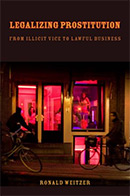Legalizing Prostitution: From Illicit Vice to Lawful Business

Author: Ronald Weitzer
New York, NY: New York University Press, 2011. 296p.
Reviewer: Samuel DeWitt | September 2012
An investigation of prostitution policy almost necessarily contains moralistic sentiments, as many authors examining the contributors to and outcomes of prostitution reform embed their arguments within two overarching perspectives. The first perspective sees prostitution as both demeaning to the women involved (in that they are treated as objects responsible for sexual fulfillment) and damaging to surrounding communities, hence arguing for policies criminalizing prostitution. The alternative perspective views prostitution as a means of empowerment for the women involved, and that the negative outcomes of prostitution (pimping, drug use, and rape, to name a few) are due solely to the fact that prostitution is criminalized, and that decriminalization or legalization of prostitution would reduce these problems dramatically.
Weitzer, however, eschews this typical polemic in favor of treating prostitution as many concepts are treated in the social sciences, as a variable; one that may result in positive or negative outcomes depending upon the individuals involved, but also on the timing and placement of prostitution practices and reforms. In doing this, Weitzer illustrates an often unacknowledged facet of prostitution — that it may bring both positive and negative outcomes, which are entirely dependent upon where prostitution is taking place and the form that it takes.
As part of the illustration of this perspective, Weitzer presents an in-depth assessment of prostitution policies within several red light districts (RLD), including RLDs in Belgium, Germany, and The Netherlands. Weitzer’s in-depth accounts of each RLD demonstrate that, while policies toward prostitution may be similar, their results may be quite different. For example, while prostitution policies in Belgium are fairly constant (city by city differences are to be expected in practice), the ecological characteristics of RLDs in different cities may vary, as is especially the case when comparing Brussels and Antwerp. Similar comparisons are conducted for several RLDs in Germany and The Netherlands with congruent results; although overarching prostitution policies are meant to produce predictable results, the intricacies of local politics and culture influence prostitution policies in ways that produce markedly different RLDs, even within the same country or province.
Throughout the book, Weitzer approaches the practice of prostitution in a logical manner, rather than coloring his observations with explicit (or implicit) moralistic language. Additionally, through his use of RLD comparisons, Weitzer demonstrates that prostitution policy should be primarily concerned with producing the least harm and the most good. In this vein, he provides a comprehensive list of the characteristics of prostitution policies that are most effective, so as to provide a potential framework for other jurisdictions to emulate when considering reform. In particular, Weitzer breaks these characteristics down into six categories (visibility, eligibility, health, rights, safety, and policy review/enforcement) each comprised of several best practices from around the world that may enable lawmakers to create effective decriminalization or legalization policies. These, he argues, could avoid the negative outcomes associated with prostitution (drug use, forced prostitution through pimping, rape, etc.) while facilitating the positive outcomes that he discovered while abroad (greater security from physical violence, greater job satisfaction, increased legitimacy, etc.).
Anyone interested in a tactical approach to prostitution reform that is well-grounded in a comprehensive evaluation of best practices from around the world would do well to read Legalizing Prostitution. Not only does this book address prostitution reform in a manner that does not rely on prevailing moral sentiments, it does so while providing a detailed account of how prostitution reform works across various areas of Europe, both within and between nations. Ultimately, Legalizing Prostitution provides an important resource for those examining prostitution reform, especially because of the author’s even-handed treatment of an intensely polarizing topic.
Samuel DeWitt is a PhD student in the Criminal Justice program at Rutgers, Newark.


